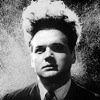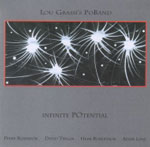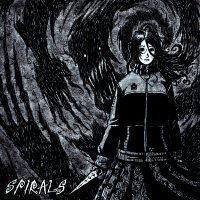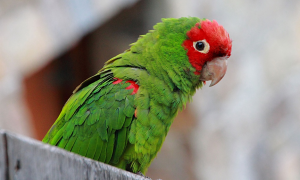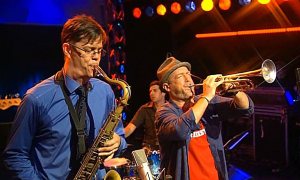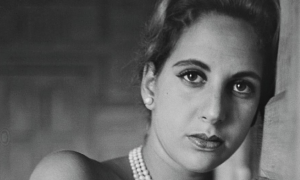Home » Jazz Articles » Genius Guide to Jazz » Wordy Gurdy Man
Wordy Gurdy Man
In 2005, Mehldau made the first significant changes to the trio since he decided to ditch the group's matching outfits.
So then.
If you subscribe to the first theory (whatever the hell that was) and believe that Evans would indeed be keen on the present tense of Our Music, then you must also believe that one of the artists he'd be most eager to see would be Brad Mehldau. Not only because Mehldau is at the forefront of today's jazz scene, but also because the pianist is playing at the Village Vanguard from October 10th through the 15th and Evans would like the opportunity to see whether he left his wallet there during his legendary set back in '61.
Brad Mehldau was born on August 23, 1970, in Florida, but grew up in Connecticut because of his parents' irrational fear of circus folk (Sarasota is the winter home of the Ringling Brothers Barnum & Bailey Circus), which is also why he studied piano instead of his first choice, the calliope. The family moved to the Hartford area, safe in the knowledge that it was the only place in the country where circuses were explicitly banned since the tragic 1944 Hartford Circus Fire.
Mehldau discovered jazz at age 12 as many boys that age do, from a friend who found a live recording of John Coltrane underneath his father's mattress. Soon, he was paying older kids to score Keith Jarrett and Bud Powell albums in plain brown wrappers for him from a local adult record store. By the time he had moved on to the harder stuff (Thelonious Monk), his parents scheduled an intervention and placed him in the recovery program of his high school's jazz band. There, the experience of hacking through Neil Hefti charts is usually enough to turn even the most wild-eyed youth off of jazz and back to the straight and narrow. Brad defied them further by winning Berklee College's Best All-Around Musician award while still just a junior which, as impressive as it is, probably didn't net him much leg in 1980's high school land.
Following his graduation from high school, Mehldau went off to New York City where his parents allowed him to study jazz at The New School (formerly, the New School of Social Research and later, The New and Improved School) after he threatened to attend Sarasota's Clown College on a pie-throwing scholarship. At the venerable Gotham institution, Mehldau studied under such important figures as Fred Hersch and Junior Mance (a Junior Mints gag would just be shooting fish in a barrel). He also used the opportunity to gig with such major names as Jimmy Cobb (no relation to Ty Cobb), and Jackie McLean (no relation to McDonald's ill-fated McLean Deluxe).
Moving forward.
After college, Mehldau sought his fortunes first as a sideman. Most notable was his work with Joshua Redman, first as the superhero team of Righteous Reed and the Ivory Assassin, then on such albums as Moodswing and Timeless Tales (For Changing Times). He also pitched in with such luminaries as Charles Lloyd (on the albums The Water is Wide and Hyperion With Higgins), Wayne Shorter (on Alegria), and Kurt Rosenwinkel (on Deep Song). This is not to mention the assistance lent to such jazz legends as John Scofield (Works For Me) and Charlie Haden (American Dreams, and helping him open a particularly obstinate jar of olives).
The mid-nineties saw two major developments in Mehldau's career. First, he formed his own trio with Larry "British Grenadier and Jorge "Martini & Rossy. This allowed him the opportunity to elucidate his creative meditations in a setting more conducive to conjugal reimaginings of the neo-traditional post-bop post-pop, quasi-nihilistic deconstructions of the shopworn song structure (if such a thing even exists). And second, he received as a gift an unabridged thesaurus, which allowed him to engage in just that sort of polysyllabic post-constructionalist circle-jerk usually reserved for graduate school, self-important blogs, and most anyone who spends too much time in Starbucks.
To continue in English, please press 2 now.
Coming into his own as a solo artist, Mehldau found his voice within the trio setting and displayed a particular knack for transforming rock songs into jazz songs with sleight-of-hand techniques learned from the great Dai Vernon and his acolyte, cardsharp Ricky Jay. Drawing from such unexpected sources as alt-rock darlings Radiohead and the august Beatles catalog, Mehldau has brought highbrow cred to popular music and popular cred to highbrow music, and all with nothing up his sleeve.
As he has continued to mature, Mehldau has drawn comparisons to Bill Evans. While both pianists were known for their lush sound and rich melodic invention, Mehldau has continually thrown off the association; though he has welcomed comparisons with Bob Evans, rightfully proud as Mehldau is of his sage-rich country sausage. As far as his music is concerned, Mehldau considers Keith Jarrett's solo work an inspiration, along with the work of Miles Davis, Larry Goldings, Jesse Davis, and country entertainer (and fellow sausage enthusiast) Jimmy Dean.
Through the nineties and into the new millennium, Mehldau has established himself not only at the forefront of jazz, but as an artist who may well transcend the limitations of genre and establish himself in the wider realm of public notice. His accessible, yet uncompromising, recordings and savvy selection of material may do for him—and for jazz—what "My Favorite Things did for John Coltrane and jazz at the dawn of the sixties. And while Julie Andrews is still alive and relatively do-able.
Forget I said that.
In 2005, Mehldau made the first significant changes to the trio since he decided to ditch the group's matching outfits. Replacing Jorge Rossy with "a much more loamy percussionist (according to the New York Times, who know their loamy percussionists) Jeff Ballard, who has not been with the group long enough to acquire a snappy nickname.
This year has seen the release of two new CD's. House on Hill, which represents material originally recorded before Warner Brothers decided to do away with their jazz division in favor of an Orange Julius franchise now occupying the space at corporate headquarters. IT was released on Nonesuch Records, a smaller Warner subsidiary whose decreased publicity budget is reflected even in the rationing of syllables in the album's title, as was Love Sublime. Recorded with operatic soprano Renée "Bubbles Fleming, represents a melding of classical and jazz influences into a cogent form best described as death metal meets gangsta rap on the set of Guys and Dolls.
Or not.
So, coming full circle back to our original idea (the current state of jazz and Brad Mehldau's place in it, or something like that), we can say without fear of contradiction that if Bill Evans were alive today, he'd still be wondering what the hell all that circus and sausage nonsense was about earlier.
Till next month, kids, exit to your right and enjoy the rest of AAJ.
Tags
PREVIOUS / NEXT
Brad Mehldau Concerts
Support All About Jazz
 All About Jazz has been a pillar of jazz since 1995, championing it as an art form and, more importantly, supporting the musicians who make it. Our enduring commitment has made "AAJ" one of the most culturally important websites of its kind, read by hundreds of thousands of fans, musicians and industry figures every month.
All About Jazz has been a pillar of jazz since 1995, championing it as an art form and, more importantly, supporting the musicians who make it. Our enduring commitment has made "AAJ" one of the most culturally important websites of its kind, read by hundreds of thousands of fans, musicians and industry figures every month.

